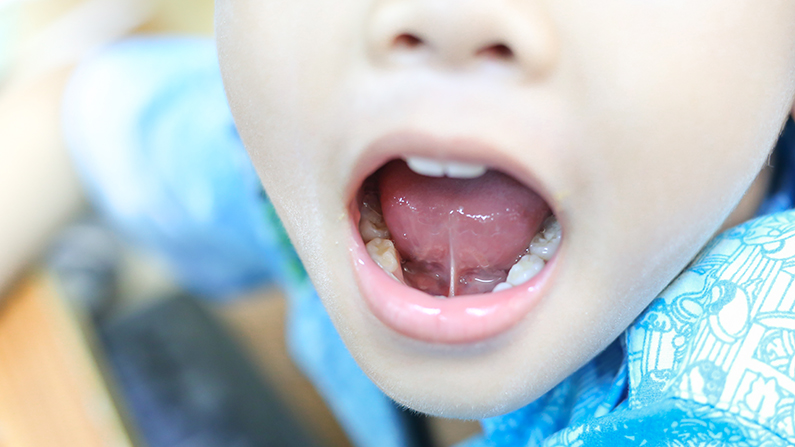Most of us imagine tongue tie to be a condition where we are too anxious or excited to speak but it can be due to a physical problem.
The medical name for tongue tie is “ankyloglossia” and it affects the movement of the tongue. The tongue is an extremely important muscle for speech development and its restriction can result in speech problems. The tongue is also very important for jaw development – especially the upper jaw, as the tongue naturally expands the mouth as a child grows, helping make way for their adult teeth.
How Does Ankyloglossia Develop?
Your child’s speech disorder or crooked teeth or malocclusion may be due to “ankyloglossia” preventing the tongue from moving freely. Before a child is born there is a strong cord-like piece of tissue which helps guide the development of mouth structures and which is positioned in the centre of the mouth. This piece of tissue is called the frenulum and once a child is born it continues to help guide the position of teeth as they begin to erupt. As a child grows, the frenulum gradually becomes thinner but is still easily visible just underneath the tongue. If the frenulum is too tight it can cause problems with tongue mobility.
How Does Tongue Tie Affect Growth and Development?
Tongue tie can negatively affect the growth of the lower jaw due to the position of the tongue. At the same time, tongue tie may lead to problems with the growth of the upper jaw as it will not receive sufficient tongue stimulation, working as a natural expander, due to limited movement. Tongue tie also has an adverse effect on normal oromuscular function, meaning a child is more likely to have initial problems with breast feeding, and later with eating and swallowing and articulating certain sounds, in particular “t,” “d” ‘th’ and “n.”
A child with ankyloglossia may have difficult extending their tongue beyond their upper or lower lips and parents or caregivers may notice that they are unable to lick an ice cream or lollipop properly. Other indications of tongue tie include problems with breast feeding, indigestion, snoring or OSA and dental problems.
It is very important to correctly assess the tongue structure and mobility as soon as possible to prevent any developmental problems.
Correcting Tongue Tie
Tongue tie surgery to release the frenulum can be straightforward and there are normally few complications. This is a simple surgery that can greatly benefit a child’s speech, self-confidence and self-esteem.

